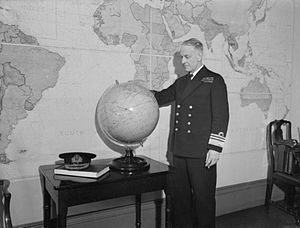Edward Neville Syfret
| Sir Edward Neville Syfret | |
|---|---|

Vice Admiral Syfret in his office at the Admiralty, January 1944
|
|
| Born |
20 June 1889 Newlands, South Africa |
| Died | 10 December 1972 (aged 83) Highgate, England |
| Allegiance | United Kingdom |
| Service/branch | Royal Navy |
| Years of service | 1904–1948 |
| Rank | Admiral |
| Commands held |
Home Fleet (1945–48) Force H (1942–43) 18th Cruiser Squadron (1941) HMS Rodney (1938–39) HMS Ramillies (1938) Naval Gunnery School, Devonport (1934–35) HMS Caradoc (1932–34) |
| Battles/wars |
First World War Second World War |
| Awards |
Knight Grand Cross of the Order of the Bath Knight Commander of the Order of the British Empire Mentioned in Despatches Commander of the Legion of Merit (United States) Croix de guerre (France) |
Admiral Sir Edward Neville Syfret, GCB, KBE (20 June 1889 – 10 December 1972) was a senior officer in the Royal Navy who saw service in both World Wars. He was knighted for his part in Operation Pedestal, the critical Malta convoy, in the Second World War.
Born the son of Edward Ridge Syfret of Cape Town in South Africa and educated at Diocesan College, South Africa and the Britannia Royal Naval College, Syfret joined the Royal Navy in 1904 and, in his early service years, specialised in naval gunnery. In World War I he became Gunnery Officer in the light cruisers HMS Aurora, HMS Centaur and HMS Curacoa. In 1927 he was Fleet Gunnery Officer, Mediterranean Fleet.
Syfret served in the Second World War initially as Captain of HMS Rodney. In 1939 he became Naval Secretary. He was made commander of the 18th Cruiser Squadron of the Home Fleet in 1941 and commanded the naval forces during Operation Ironclad, the invasion of Madagascar in May 1942 and was convoy commander for Operation Pedestal, a critical Malta Convoy in August 1942. He was appointed Commander of Force H later that year and then, in 1943, became Vice Chief of the Naval Staff.
...
Wikipedia
